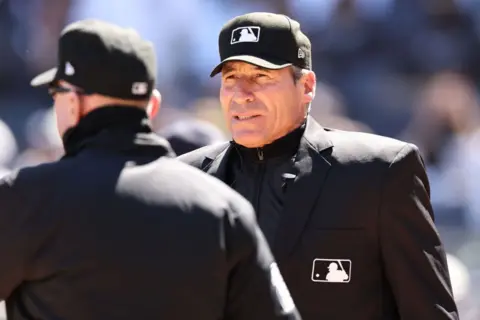
 Getty Images
Getty Images
For many fans of America’s favourite pastime, it was past time that he retired.
Now one of the most vilified umpires in Major League Baseball has granted critics their wish.
Angel Hernández, an MLB umpire for over 30 years, announced on Monday night that he would be stepping down.
US media reacted by labelling him the “most disliked”, “most controversial” and “worst umpire” in professional baseball.
The actual data shows Hernández was not the worst umpire in the game - just merely below average.
But the wrong calls he did make were egregiously wrong, according to his detractors.
Since umpiring his first MLB game in 1991, Hernández has drawn scorn from nearly everyone.
“Whenever I watched or went to a game, no matter what team, when you saw that [Angel Hernández] was behind the plate, you knew it was going to be a disaster,” says Roberta Newman, a New York University professor who has written several books on baseball.
“This isn’t just a matter of opinion. He misses calls constantly and is wildly inaccurate.”
Hernández’s job was no easy one - using the naked eye to track a ball flying in a split second from pitcher to home plate at over 100mph (160km/h).
But forgiveness can be in short supply in an $11bn (£8.6bn) sports league.
He received the most criticism for calls he made in the strike zone – the targeted area the baseball must cross on its way towards the hitter to be considered a strike rather than a ball (a pitch that isn’t swung for by the batter).
After news of Hernández’s retirement, an “anti-highlight reel” surfaced on X, formerly Twitter, showcasing some of his most disagreeable calls.
One clip shows him calling a strike for a ball thrown well outside the strike zone, which prompted the sports announcer to laugh and say “that wasn’t even close”.
In one of the most viral moments, Philadelphia Phillies outfielder Kyle Schwarber slammed his baseball bat and helmet on the ground, marched up to Hernández and shouted at him – inches from his face.
“He needs to find another job,” Ian Kinsler, a former MLB athlete, said about Hernández in 2017.
Intense criticism of MLB umpires is not new, however, Prof Newman points out. “It runs like a thread through baseball history.”
She cites the popular poem Mother May I Slug the Umpire, published in the Chicago Tribune in 1886.
And TV has only added to the woes of umpires, Prof Newman notes. Once the strike zone was digitised for TV in the early 2000s – appearing on screen as a white rectangular box – it created a nation of increasingly opinionated armchair umpires.
“Now you can see how bad the call is for yourself,” Prof Newman says. “That adds to the enmity.”
There is further indication that Hernández made the wrong calls, though, Prof Newman says.
Despite being in the MLB for 34 seasons, he had not worked a World Series game since 2005, nor umpired a league championship series since 2016.
He was also never promoted to crew chief like many others with his level of tenure.
This prompted the Cuba-born Hernández to file a lawsuit against the league in 2017, alleging racial discrimination. A federal appeals court rejected the legal action last year.
The BBC has contacted his lawyer for comment about his decision to retire and whether it was prompted by the outcome of the lawsuit.
Announcing his retirement, Hernández said in a statement: “Starting with my first Major League game in 1991, I have had the very good experience of living out my childhood dream of umpiring in the Major Leagues.
“There is nothing better than working at a profession that you enjoy.”
Despite the vitriol, the game loved him back, says Ricardo Rodriguez, director of the Baseball Heritage Museum in Cleveland, Ohio.
“I believe that the relationship between MLB umpires and the fans is an amalgamation of love and hate,” Mr Rodriguez says.
“Somebody’s got to make the calls, and not all the calls are black and white.”

 6 months ago
23
6 months ago
23








